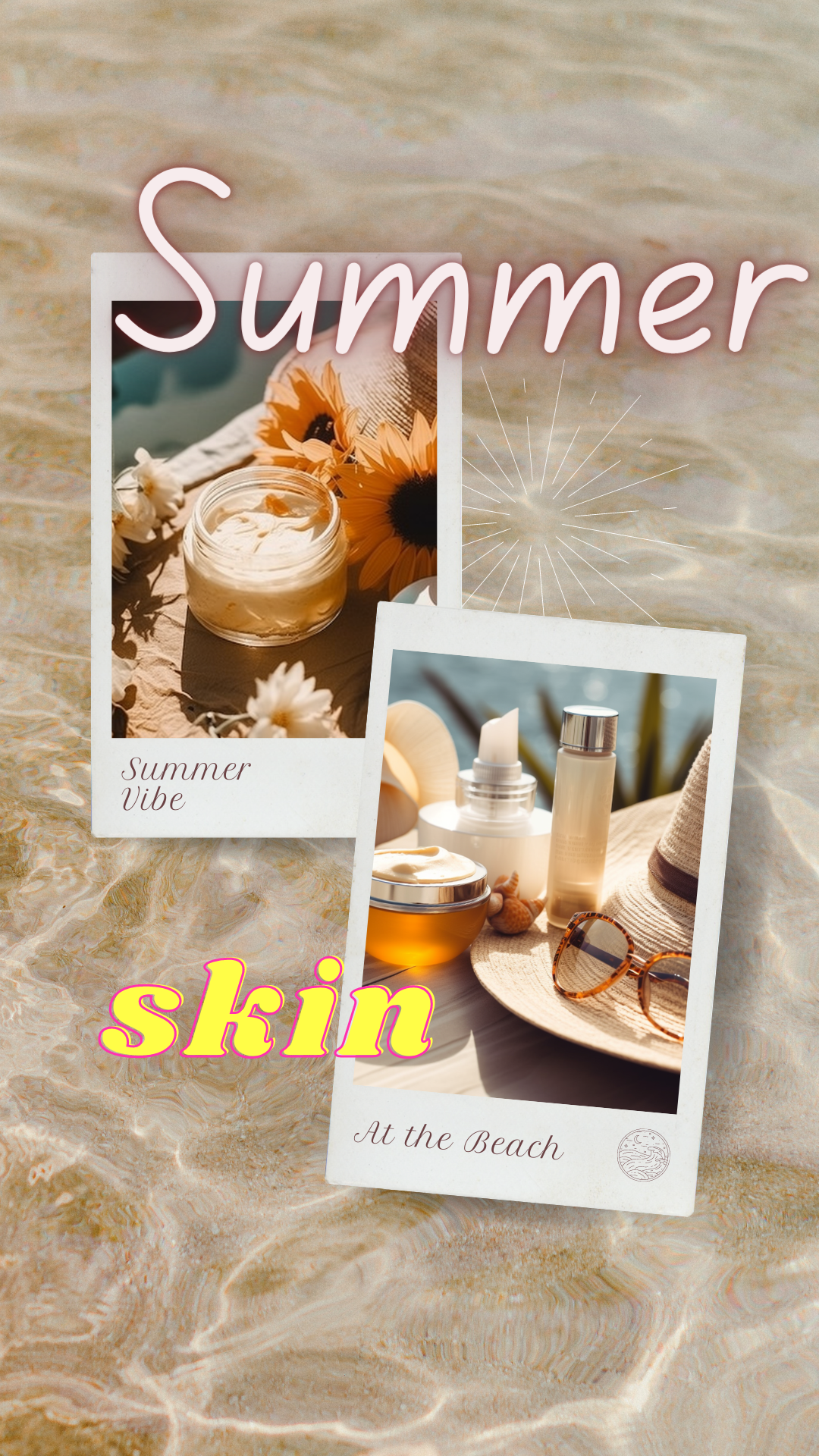Summer Skin Care take care of your skin while enjoying the sun
***freeDIGIBOOK***Summer outfit ideas to experiment with different styles and looks
1. The importance of sunscreen: Understanding the importance of sunscreen and how to choose the right product for your skin type.
Sunscreen is one of the most important products you can use to protect your skin during the summer months. It helps to prevent skin damage, premature aging, and even skin cancer caused by harmful UV rays from the sun.
Here are some things to consider when choosing a sunscreen:
Look for a broad-spectrum sunscreen: This means that the sunscreen will protect against both UVA and UVB rays, which can cause skin damage and increase the risk of skin cancer.
Choose the right SPF: The American Academy of Dermatology recommends using a sunscreen with at least SPF 30, which blocks about 97% of UVB rays. Higher SPFs provide slightly more protection, but no sunscreen can block 100% of UV rays.
Consider your skin type: If you have sensitive skin or are prone to breakouts, look for a sunscreen that is labeled “oil-free” or “non-comedogenic.” If you have dry skin, look for a sunscreen that contains moisturizing ingredients.
Choose a product that you like: It’s important to choose a sunscreen that you’ll actually use. Try different products and find one that feels comfortable on your skin and doesn’t cause irritation or breakouts.
Reapply often: Sunscreen can wear off or become less effective over time, so it’s important to reapply it every two hours or after swimming or sweating.
By choosing the right sunscreen and using it correctly, you can protect your skin from the harmful effects of UV rays and enjoy the summer sun safely. Remember, even on cloudy days, UV rays can still penetrate the skin and cause damage, so it’s important to wear sunscreen every day, especially during the summer months.
2. The effects of UV rays on the skin: Understanding the harmful effects of UV rays on the skin and how to protect against them.
UV rays from the sun can cause a variety of harmful effects on the skin.
Here are some of the most common effects of UV exposure and how to protect against them:
Sunburn: Sunburn is a common result of overexposure to UV rays. To protect against sunburn, wear protective clothing and apply sunscreen with at least SPF 30, and reapply every two hours.
Premature aging: UV rays can cause premature aging, such as wrinkles and age spots. To protect against premature aging, wear a wide-brimmed hat and sunglasses, and apply sunscreen regularly.
Skin cancer: Prolonged exposure to UV rays can increase the risk of skin cancer. To protect against skin cancer, avoid prolonged exposure to the sun, wear protective clothing, and apply sunscreen regularly.
Uneven skin tone: UV exposure can cause uneven skin tone and hyperpigmentation. To protect against uneven skin tone, use a broad-spectrum sunscreen and wear protective clothing.
To protect against the harmful effects of UV rays, it’s important to take steps to protect your skin. This includes wearing protective clothing, such as long-sleeved shirts and wide-brimmed hats, and applying sunscreen regularly. It’s also important to avoid prolonged exposure to the sun, especially during peak hours when UV rays are strongest. By taking these steps, you can enjoy the summer sun while protecting your skin from harm.
3. How to protect your skin while enjoying outdoor activities: Tips for protecting your skin while enjoying outdoor activities, such as swimming, hiking, and camping.
When enjoying outdoor activities during the summer, it’s important to take steps to protect your skin from the sun’s harmful rays. Here are some tips for protecting your skin while enjoying outdoor activities:
Wear protective clothing: Clothing can be one of the best forms of sun protection. Wear clothing that covers your arms and legs, and look for items with a UPF (ultraviolet protection factor) rating. A UPF rating of 50 or higher is recommended.
Apply sunscreen: Apply sunscreen with at least SPF 30, and reapply every two hours or after swimming or sweating. Don’t forget to apply sunscreen to your ears, neck, and other often overlooked areas.
Seek shade: When possible, seek out shade to reduce your exposure to the sun. This can include sitting under an umbrella or tree, or taking breaks in shaded areas.
Wear a hat: A wide-brimmed hat can help protect your face, neck, and ears from the sun. Look for a hat with a brim of at least three inches.
Use sunglasses: Sunglasses can help protect your eyes from UV rays and reduce the risk of cataracts. Look for sunglasses with UV protection.
Stay hydrated: Drinking plenty of water can help keep your skin hydrated and healthy, especially when spending time outdoors in the sun.
Limit your time in the sun: When possible, try to limit your time in the sun, especially during peak hours when UV rays are strongest.
By taking these steps, you can enjoy outdoor activities while protecting your skin from the sun’s harmful rays. Remember, it’s important to protect your skin even on cloudy days, as UV rays can still penetrate the skin and cause damage.
4. Summer skin care for oily skin: Tips and products for managing oily skin during the summer months.
Summer can be a challenging time for those with oily skin, as the heat and humidity can cause excess oil production and breakouts.
Here are some tips and products for managing oily skin during the summer months:
Cleanse regularly: Cleansing your skin twice a day can help remove excess oil and prevent breakouts. Look for a gentle, oil-free cleanser that won’t strip your skin of its natural oils.
Use a toner: Toner can help remove any remaining dirt and oil from your skin and can help control excess oil production. Look for a toner that contains salicylic acid, which can help unclog pores and reduce oil production.
Use oil-free moisturizer: Moisturizing your skin is still important, even if you have oily skin. Look for an oil-free moisturizer that won’t clog your pores or contribute to excess oil production.
Use blotting papers: Blotting papers can help remove excess oil from your skin throughout the day without disrupting your makeup. Look for blotting papers that are made specifically for oily skin.
Avoid heavy makeup: Heavy makeup can contribute to excess oil production and clogged pores. Look for lightweight, oil-free makeup products that won’t clog your pores.
Use a clay mask: Clay masks can help absorb excess oil and unclog pores. Look for a clay mask that contains ingredients like kaolin clay or bentonite clay.
Protect your skin with sunscreen: Even if you have oily skin, it’s important to protect your skin from the sun’s harmful rays. Look for a lightweight, oil-free sunscreen that won’t contribute to excess oil production.
By following these tips and using the right products, you can manage oily skin during the summer months and keep your skin healthy and clear.
5. Summer skin care for dry skin: Tips and products for moisturizing dry skin during the summer months.
Summer can be a challenging time for those with dry skin, as the heat and sun can cause even more dehydration and dryness.
Here are some tips and products for moisturizing dry skin during the summer months:
Use a gentle, hydrating cleanser: Look for a cleanser that won’t strip your skin of its natural oils, and contains hydrating ingredients like hyaluronic acid or glycerin.
Exfoliate regularly: Exfoliating your skin can help remove dead skin cells and allow your moisturizer to better penetrate your skin. Look for a gentle exfoliant that won’t irritate your skin.
Use a lightweight, hydrating moisturizer: Look for a lightweight, non-greasy moisturizer that contains hydrating ingredients like hyaluronic acid or ceramides.
Use a hydrating serum: Serums can help provide an extra boost of hydration to your skin. Look for a serum that contains ingredients like hyaluronic acid or vitamin C.
Use a face mist: A hydrating face mist can help refresh and hydrate your skin throughout the day. Look for a mist that contains hydrating ingredients like aloe vera or glycerin.
Protect your skin with sunscreen: Even if you have dry skin, it’s important to protect your skin from the sun’s harmful rays. Look for a moisturizing sunscreen that won’t dry out your skin.
Stay hydrated: Drinking plenty of water can help keep your skin hydrated and healthy, especially during the summer months.
By following these tips and using the right products, you can moisturize your dry skin during the summer months and keep your skin healthy and radiant.
6. Treating and preventing sunburn: Tips for treating and preventing sunburn, including home remedies and over-the-counter products.
Sunburn can be a painful and uncomfortable result of overexposure to the sun.
Here are some tips for treating and preventing sunburn:
Use sunscreen: The best way to prevent sunburn is to use sunscreen with at least SPF 30, and to reapply every two hours or after swimming or sweating.
Wear protective clothing: Clothing can provide an extra layer of protection against the sun’s harmful rays. Wear clothing that covers your arms and legs, and look for items with a UPF (ultraviolet protection factor) rating.
Seek shade: When possible, seek out shade to reduce your exposure to the sun. This can include sitting under an umbrella or tree, or taking breaks in shaded areas.
Apply cool compresses: To soothe sunburned skin, apply cool compresses to the affected areas. You can use a cool, damp towel or take a cool bath or shower.
Use aloe vera: Aloe vera can help soothe sunburned skin and reduce inflammation. Apply aloe vera gel to the affected areas several times a day.
Take over-the-counter pain relievers: Over-the-counter pain relievers like ibuprofen or acetaminophen can help reduce pain and inflammation associated with sunburn.
Stay hydrated: Drinking plenty of water can help keep your skin hydrated and help your body heal from sunburn.
By following these tips and using the right products, you can treat and prevent sunburn and keep your skin healthy and protected during the summer months. Remember, it’s important to protect your skin even on cloudy days, as UV rays can still penetrate the skin and cause damage.
7. How to keep your skin hydrated during the summer: Tips for keeping your skin hydrated during the hot and humid summer months.
During the summer, hot and humid weather can cause your skin to lose moisture and become dehydrated. Here are some tips for keeping your skin hydrated during the summer months:
Drink plenty of water: Staying hydrated from the inside out is key to keeping your skin hydrated. Aim to drink at least eight glasses of water per day.
Use a lightweight, hydrating moisturizer: Look for a moisturizer that’s lightweight and non-greasy, but still contains hydrating ingredients like hyaluronic acid or glycerin.
Use a hydrating serum: Serums can help provide an extra boost of hydration to your skin. Look for a serum that contains hydrating ingredients like hyaluronic acid or vitamin C.
Use a face mist: A hydrating face mist can help refresh and hydrate your skin throughout the day. Look for a mist that contains hydrating ingredients like aloe vera or glycerin.
Take cool showers: Hot showers can strip your skin of its natural oils and contribute to dehydration. Take cool showers instead, and limit your shower time to no more than 10 minutes.
Use a humidifier: If you’re spending a lot of time indoors in air-conditioned spaces, a humidifier can help add moisture back into the air and prevent your skin from becoming dehydrated.
Avoid harsh skincare products: Harsh skincare products, like those containing alcohol or fragrances, can strip your skin of its natural oils and contribute to dehydration. Look for gentle, hydrating products instead.
By following these tips and using the right products, you can keep your skin hydrated and healthy during the hot and humid summer months.
8. The benefits of exfoliating in the summer: Understanding the benefits of exfoliating and how to incorporate it into your summer skin care routine.
Exfoliating can be a beneficial step in your summer skincare routine. Here are some benefits of exfoliating and how to incorporate it into your summer skincare routine:
Removes dead skin cells: Exfoliating helps to remove dead skin cells that can build up on the skin’s surface, making your skin look dull and clogging your pores.
Improves skin texture: Exfoliating can help to improve the texture of your skin, leaving it feeling smoother and softer.
Increases absorption of skincare products: By removing dead skin cells, exfoliating can also help your skin absorb other skincare products more effectively.
Can help prevent breakouts: Exfoliating can help to prevent breakouts by unclogging pores and removing dirt and oil buildup.
To incorporate exfoliating into your summer skincare routine, follow these tips:
Choose the right exfoliant: Look for a gentle exfoliant that won’t irritate your skin. Options include physical exfoliants, like scrubs or brushes, or chemical exfoliants, like alpha-hydroxy acids (AHAs) or beta-hydroxy acids (BHAs).
Exfoliate 1-2 times per week: Depending on your skin type, you may want to exfoliate once or twice a week. Be careful not to over-exfoliate, as this can irritate your skin.
Be gentle: When exfoliating, be gentle with your skin. Don’t scrub too hard or use harsh products, as this can damage your skin.
Follow up with moisturizer: After exfoliating, be sure to follow up with a hydrating moisturizer to help soothe and nourish your skin.
By incorporating exfoliation into your summer skincare routine, you can help to improve the texture of your skin and prevent breakouts, leaving your skin looking healthy and radiant.
9. Natural remedies for summer skin care: Tips for using natural ingredients, such as aloe vera and coconut oil, for summer skin care.
Natural ingredients can be a great addition to your summer skincare routine, as they can help soothe and protect your skin without harsh chemicals. Here are some tips for using natural ingredients, such as aloe vera and coconut oil, for summer skincare:
Aloe vera: Aloe vera is a natural ingredient that can help soothe sunburned skin and reduce inflammation. Simply apply aloe vera gel to the affected areas several times a day.
Coconut oil: Coconut oil is a natural moisturizer that can help hydrate dry skin during the summer months. Apply coconut oil to your skin after a shower or bath to help lock in moisture.
Green tea: Green tea is a natural antioxidant that can help protect your skin from sun damage. Brew a cup of green tea and let it cool, then use a cotton ball to apply the tea to your skin.
Honey: Honey is a natural antibacterial and anti-inflammatory ingredient that can help soothe and hydrate your skin. Mix honey with warm water and apply it to your skin for 10-15 minutes before rinsing off.
Cucumber: Cucumber is a natural ingredient that can help soothe and hydrate sunburned skin. Simply slice a cucumber and place the slices on the affected areas.
Oatmeal: Oatmeal is a natural ingredient that can help soothe itchy or irritated skin. Mix oatmeal with water to create a paste, and apply it to your skin for 10-15 minutes before rinsing off.
Avocado: Avocado is a natural moisturizer that can help hydrate dry skin. Mash up an avocado and apply it to your skin for 10-15 minutes before rinsing off.
By incorporating natural ingredients into your summer skincare routine, you can help protect and nourish your skin without harsh chemicals. However, it’s important to remember that natural remedies may not be suitable for everyone and may cause allergies or irritations. It’s best to do a patch test before trying any new ingredient or product.
10. How to transition your skin care routine from spring to summer: Tips for adjusting your skin care routine as the weather warms up, including switching to lighter moisturizers and using products with SPF.
As the weather gets warmer, it’s important to adjust your skincare routine to keep your skin healthy and protected during the summer months.
Here are some tips for transitioning your skincare routine from spring to summer:
Switch to lighter moisturizers: As the weather gets warmer and more humid, you may not need as heavy of a moisturizer as you did in the spring. Switch to a lighter, oil-free moisturizer to prevent clogged pores and breakouts.
Use products with SPF: As the sun gets stronger, it’s important to protect your skin from harmful UV rays. Switch to a daily moisturizer or sunscreen with at least SPF 30 to keep your skin protected.
Add a toner: Summer heat and humidity can cause excess oil production, leading to clogged pores and breakouts. Adding a toner to your skincare routine can help balance oil production and keep your skin clear.
Exfoliate regularly: Sweating and increased oil production during the summer months can cause buildup of dead skin cells, leading to dull and congested skin. Exfoliate once or twice a week to help remove dead skin cells and prevent breakouts.
Hydrate from the inside out: Drinking plenty of water and eating a healthy, balanced diet can help keep your skin hydrated and healthy during the summer months.
Protect your eyes and lips: Don’t forget to protect your eyes and lips from the sun’s harmful rays. Use sunglasses with UV protection and a lip balm with SPF to keep these sensitive areas protected.
By adjusting your skincare routine for the summer months, you can keep your skin healthy, protected, and glowing all season long.
Summer is a time for fun and relaxation, but it’s important to take care of your skin while enjoying the sun and warmth. From protecting your skin against UV rays to keeping it hydrated during the hot and humid months, there are many ways to take care of your skin during the summer season. By following a few simple tips and incorporating the right products into your skin care routine, you can keep your skin healthy, glowing, and protected all summer long. Remember to wear sunscreen, drink plenty of water, and adjust your skin care routine as the weather changes to ensure that your skin stays healthy and radiant. With a little bit of effort and attention, you can enjoy all that summer has to offer while keeping your skin looking and feeling its best.




